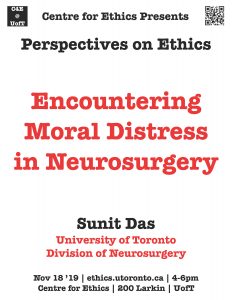
Encountering Moral Distress in Neurosurgery
In a recent survey of neurosurgery residents in the US, a large majority of trainees stated that they felt inadequately trained to discuss issues of end-of-life care and palliation with patients. Further, 87% of respondents said they had participated in surgeries with which they disagreed. My own experience as a staff physician has suggested that the lack of clarity regarding end-of-life decisions in the care of neurosurgical patients is as present an issue following the completion of training and the primary assumption of these responsibilities. I will attempt to contextualize these issues with the following framework questions:
1. The burden of uncertainty–how do we proceed when we don’t know what is “right”? How do we cope when it doesn’t turn out as we had hoped?
2. The burden of hope–how do we proceed when we are asked to pursue the nominal? Our hope, our patients’s hope, our patients’s family’s hope.
3. The burden of duty–what is the cost of action that we do not believe in or feel is a wrong choice?
➡︎ please register here
Sunit Das
University of Toronto Faculty of Medicine, Division of Neurosurgery, St. Michael’s Hospital & Centre for Ethics, University of Toronto
Mon, Nov 18, 2019
04:00 PM - 06:00 PM
Centre for Ethics, University of Toronto
200 Larkin
